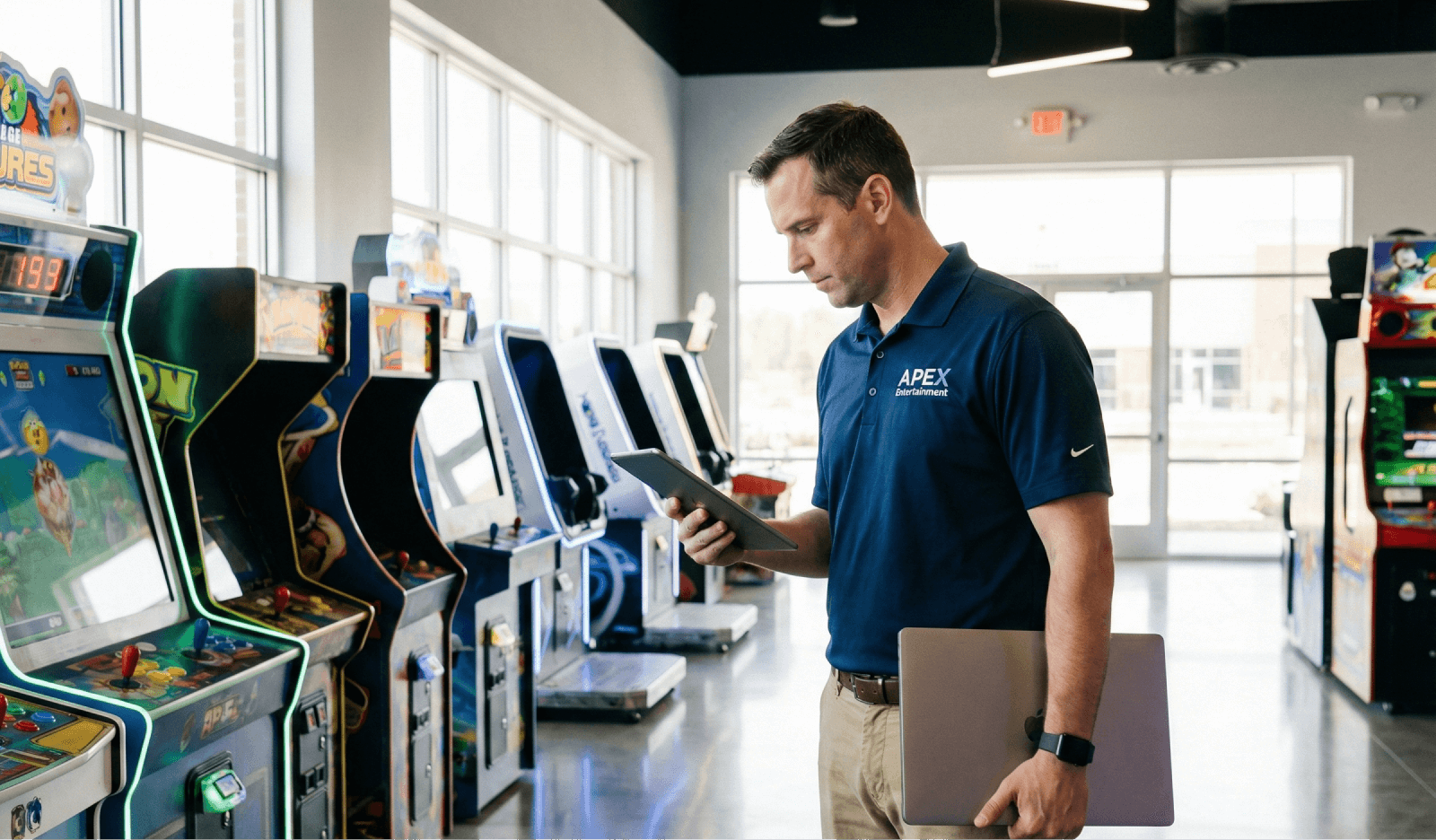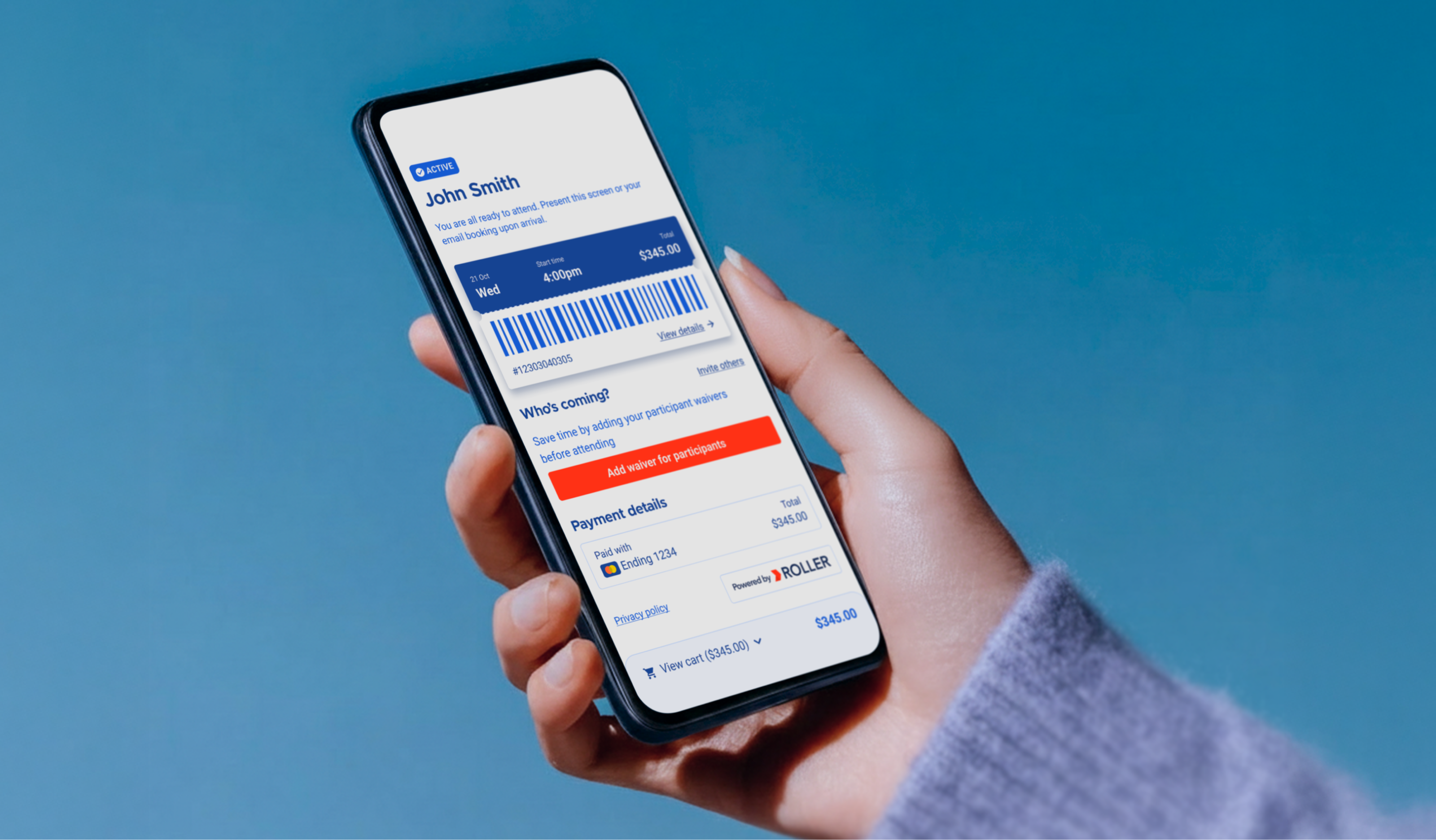How to Sell Tickets Online: A Complete Guide for Attraction Venues
.png?width=820&name=Blog%20thumbnail_How%20to%20Sell%20Tickets%20Online_%20A%20Complete%20Guide%20for%20Attraction%20Venues%20(1).png)
Whether you run a trampoline park, a water park, a go-kart track, or a multi-attraction family entertainment center, this guide will walk you through how to successfully sell tickets online—from choosing the right platform to optimizing your system for revenue growth.
Why online ticketing is key for modern attractions
In an era of instant gratification and digital-first expectations, guests want to buy tickets anytime, from anywhere, on any device. The benefits of offering online ticketing for your attraction go well beyond convenience.
Benefits include:
- Higher revenue: Online pre-sales boost advance bookings, enable upsells, and reduce cart abandonment.
Operational efficiency: Digital tickets reduce wait times, eliminate manual entry errors, and free up your team for guest-facing roles. - Data and insights: Online sales give you the data you need to make smarter decisions—from pricing strategy to staffing.
Read more: Electronic Ticketing for Attractions: A Complete Guide for Venue Operators
Step 1: Choose the right ticketing platform for attractions
The foundation of successful online ticket sales is a platform designed specifically for the attractions industry. Not all systems are created equal, so look for one that meets these criteria:
- Purpose-built for attractions: Your software should support the unique needs of your venue, such as timed entry, waivers, group bookings, season passes, and multi-venue operations.
- All-in-one functionality: Avoid the headache of managing multiple disconnected systems. The ideal platform will combine point of sale (POS), ticketing, memberships, waivers, guest feedback, and analytics in one seamless solution.
- User-friendly design: Choose a platform that your team can learn quickly, especially if you operate with seasonal hires or high staff turnover.
How ROLLER helps: ROLLER’s all-in-one cloud-based system is purpose-built for the attractions industry. From online checkout to memberships and waivers, everything works together—streamlining your operations and enhancing the guest experience.
Step 2: Set up your ticket types and pricing
The way you structure your ticket options should align with the experiences you offer and how guests typically engage with your venue. This not only clarifies expectations but also opens the door for upselling and personalization.
Common ticket types include:
- General admission or timed entry: Control capacity and smooth out demand across time slots.
- Combo packages: Bundle experiences like skating + arcade or go-karting + laser tag to increase perceived value.
- Memberships or season passes: Encourage repeat visits with flexible pricing models.
- Group and party bookings: Offer customizable packages for birthdays, schools, or corporate events.
- Add-ons: Provide extras such as grip socks, food vouchers, lockers, or skip-the-line passes.
For example, a trampoline park could offer:
- $25 Single jump session
- $40 All-day pass
- $10 Add-on: grip socks
- $200 Birthday party package
Read more: Ticket Pricing Strategies: How to Drive Revenue and Keep Guests Coming Back
How ROLLER helps: With ROLLER, operators can create flexible ticketing options, set variable pricing by date or time, and manage discounts, memberships, and group bookings—all in one place.
Step 3: Embed and promote your ticketing system on your website
To sell tickets through your website, integration should be seamless—no redirects or confusing portals.
- Embed a widget directly on high-traffic pages (homepage, “Plan Your Visit,” etc.)
- Use clear CTAs like “Buy Tickets” or “Book Now” across the site
- Optimize for mobile because a large share of bookings happen via smartphone
How ROLLER helps: ROLLER’s modern checkout widget embeds directly onto your website, allowing guests to browse, select, and pay without leaving your page. This minimizes friction and boosts conversion rates.
Step 4: Market your tickets effectively
Even the best ticketing system won’t drive sales on its own. You need to market it strategically—targeting the right people at the right time with the right message.
Here’s how to get started:
- Retargeting visitors who abandoned checkout with email or display ads
- Promoting special events or ticket bundles on your homepage and via email
- Partnering with local hotels, schools, or influencers to drive group bookings
Don’t just post for the sake of it—social media should drive action. Instead of generic updates like your opening hours, promote limited-time offers (e.g., “Jump for $10 this Tuesday only”) or showcase unique experiences (“Book now—only 5 party slots left this weekend!”). Make every post count.
Step 5: Streamline the guest experience
Your guests’ impression of your business starts the moment they book—so make sure every step that follows is just as smooth.
To provide a frictionless end-to-end experience:
- Send confirmation emails that include scannable QR codes or digital wallet options
- Allow pre-visit options like signing waivers online
- Enable self-check-in via mobile scanning or self-serve kiosks to keep lines short
- Follow up after the visit with automated emails requesting reviews or promoting return offers
How ROLLER helps: With ROLLER, guests can check in quickly using mobile tickets and pre-signed waivers.
Step 6: Analyze your data to grow smarter
Data is your roadmap to better decisions. Once your ticketing system is in place, monitor key metrics to uncover opportunities for growth.
Metrics to track include:
- Conversion rate: How many site visitors complete a booking.
- Average spend per guest: To assess pricing and upsell effectiveness.
- No-show rate: To evaluate whether reminders or pre-paid tickets reduce drop-offs.
- Top-performing ticket types: To guide promotions and pricing.
- Campaign performance: To understand which marketing channels drive sales.
How ROLLER helps: ROLLER’s analytics dashboards help you track performance across tickets, promotions, guest behavior, and revenue. With these insights, you can make confident, data-backed decisions.
Conclusion
Selling tickets online doesn’t have to be complicated—but it does need to be strategic. With the right platform, you’ll drive more revenue, improve the guest experience, and make life easier for your team.
Want to learn how ROLLER can help your venue sell tickets online and deliver unforgettable experiences? Book a demo today.
Frequently asked questions about selling tickets online
How can I sell tickets online for my event?
What is the best way to sell tickets online?
How do I sell tickets through my website?
What platform can I use to sell tickets online?
What features should attractions look for in a ticketing platform?
Essential features in a ticketing platform include:
- Online checkout and mobile ticketing
- Waiver and party management
- Membership and loyalty programs
- POS integration
- Real-time analytics
- Staff-friendly interface
How do I manage capacity when selling tickets online?
How do I reduce no-shows with online ticket sales?
How do I track revenue from online ticketing?
What’s the best way to upsell with digital tickets?
Related articles



Digital Ticketing Solutions: A Complete Guide for Venue Owners and Operators
Enhance your guest experience
Get free education, tips and inspiration to help you run a successful venue.
